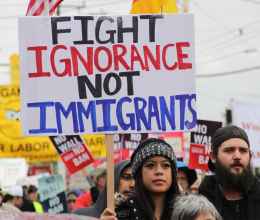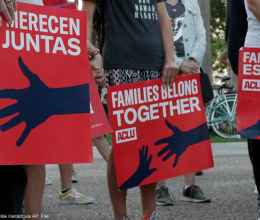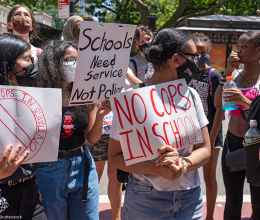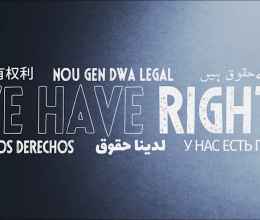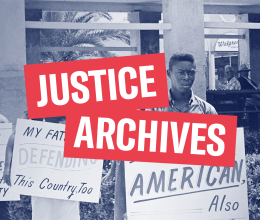
In just one week, President Donald Trump has launched the most systemic and aggressive assault on human rights in U.S. presidential history.
Already, his administration has disengaged with the United Nations Human Rights Council — even though the U.S. is not a current member — defunded a UN refugee agency the U.S. long supported, ordered sanctions against the chief prosecutor of the International Criminal Court, ordered to review ratified U.S. treaties that are the law of the land, and threatened to commit ethnic cleansing in Gaza.
While the first Trump administration made similar attempts to hinder human rights, including when it withdrew from the Human Rights Council in 2018 and sanctioned ICC officials in 2020, the second Trump administration has been far more drastic, aggressive, and concentrated in its actions. There is no doubt that the larger goal is to dismantle – or at least severely disrupt – international human rights and global justice frameworks that have, for decades, protected our collective, universal rights and provided avenues for accountability.
In 2018, partly in response to a damning UN expert visit and report on extreme poverty in the U.S., the Trump administration decided to pull out of the Human Rights Council, calling it “cesspool of political bias,” and stopped cooperating with other UN human rights experts. However, in 2020, the Trump administration participated in the Universal Periodic Review (UPR), which scrutinized the United States’ human rights record and held it accountable on a global level. The next UPR session is scheduled in November of this year. It remains unclear, and unlikely, that the administration will participate.
In 2020, Trump’s sanctions against ICC officials were widely condemned and challenged in federal courts, including by the ACLU. A federal court blocked the government from enforcing the order against academics and scholars, who challenged its unconstitutionality on First Amendment grounds. President Joe Biden eventually rescinded Trump's order in 2021. This year, however, shortly after taking office, Trump issued an executive order again targeting the ICC with new sanctions. The new executive order is an affront to international global justice and raises serious First Amendment concerns because it creates a serious chilling effect on people in the United States for among other things helping the court identify and investigate atrocities that fall within its jurisdiction.
Seventy-nine countries issued a statement defending the Court and warning that “such measures increase the risk of impunity for the most serious crimes and threaten to erode the international rule of law, which is crucial for promoting global order and security.” Earlier this week, 17 independent UN human rights experts released a statement expressing grave concern over Trump’s new executive order calling it “an attack on global rule of law and strikes at the very heart of the international criminal justice system.”
The Trump administration’s efforts are part of a broader anti-rights agenda that organizations like the Heritage Foundation – the mastermind behind Project 2025 – promote as a way to weaken international human rights and entrench the use of national security and sovereignty as pretexts to evade accountability for gross violations of these rights. For example, the Trump administration previously established the Commission on Unalienable Rights, which attempted to redefine and weaken international human rights through a new hierarchy of rights that would elevate religion and property over basic human rights. More recently, the Heritage Foundation published an article echoing this stance, citing former Secretary of State Mike Pompeo’s 60-page draft report in its call to roll back decades of progress in international human rights law.
The new Trump administration’s actions, however, are notably more audacious and dangerous because they aim to unilaterally undermine ratified human rights treaties that, according to our Constitution, are the law of the land. For instance, Trump’s executive order issued earlier this month calls for a “review of all international intergovernmental organizations of which the United States is a member and provides any type of funding or other support, and all conventions and treaties to which the United States is a party.” This order seeks to determine which organizations, conventions, and treaties are contrary to U.S. interests and whether such organizations, conventions, or treaties can be reformed. The review also requires recommendations regarding whether the U.S. should withdraw from any such organizations, conventions, or treaties. Trump’s review of these international organizations and agreements may lead to defunding critical human rights mechanisms — including the Inter-American Commission on Human Rights, the UN special procedures, and treaty bodies that effectively monitor and investigate human rights violations worldwide – that have been cornerstones of the modern human rights system.
Importantly, the United States has only ratified three treaties out of nine core international human rights conventions that have been negotiated and adopted since World War II. The treaties that were ratified in the early 1990s — the International Covenant on Civil and Political Rights (ICCPR); the Convention Against Torture and Other Cruel, Inhumane, or Degrading Treatment or Punishment (CAT); and the International Convention on the Elimination of All Forms of Racial Discrimination (ICERD) – were subject to reservations from the Senate. These reservations, and an ever increasing anti-human rights agenda, meant that the treaties have never been incorporated through legislation, rendering them significantly less impactful and enforceable domestically.
Now, the second Trump administration is ordering a review that would further weaken these treaties and decimate our nation’s human rights obligations. Civil society organizations and experts have also cautioned that these increasing attacks against both domestic and international human rights will embolden global authoritarianism and make the world less safe, especially for historically -marginalized communities.
This week, 16 former and current American UN experts released a statement criticizing the Trump administration’s executive orders, stating, “[this] assault on the rule of law fails to advance any conceivable American national interest, which lies in a worldwide system founded on principles of human rights, the non-use of force, collaboration to solve global problems, and the sovereign equality of states. The administration’s actions betray each of these well-established international principles.”
Trump’s attacks against international human rights bodies mirror the regressive, despotic measures taken against domestic entities and public servants, especially those who have been involved in acting as government watchdogs or pursuing accountability for civil and human rights abuses. These anti-human rights orders aim to significantly weaken accountability for violating international law, neutralize opposition to his dangerous agenda, and potentially usurp congressional powers.
Trump’s efforts to erode our universal human rights must be stopped. Weakening domestic and international human rights and justice will only cause severe harms, instability, and more violence at home and globally.

